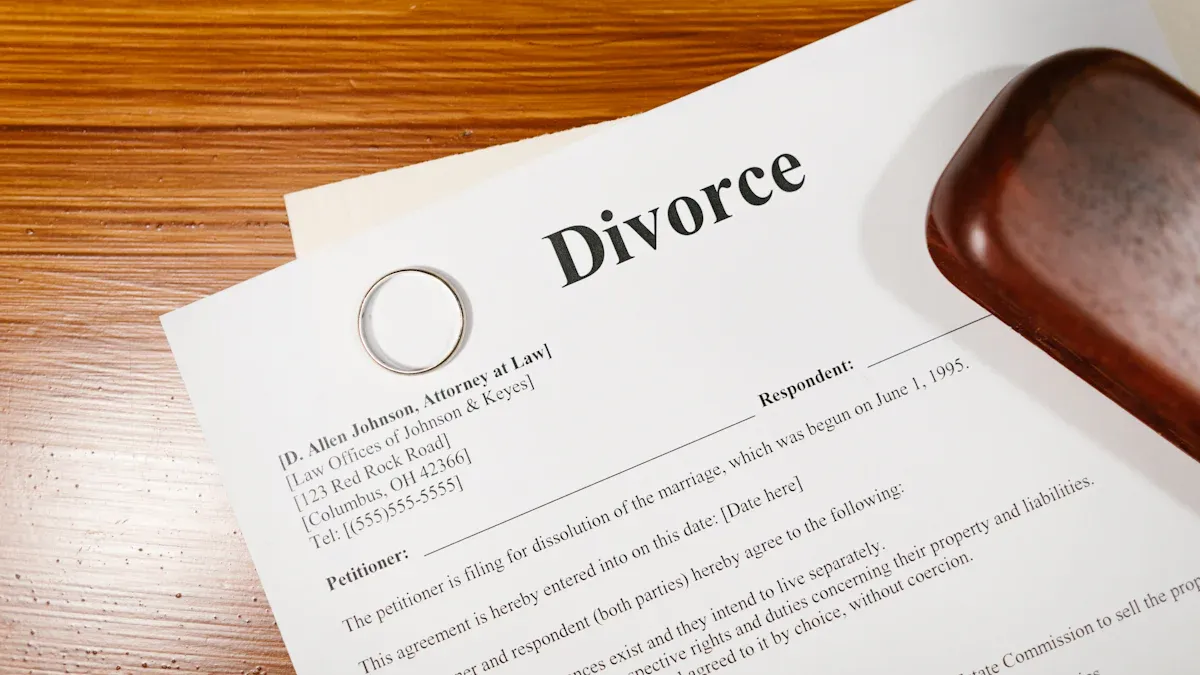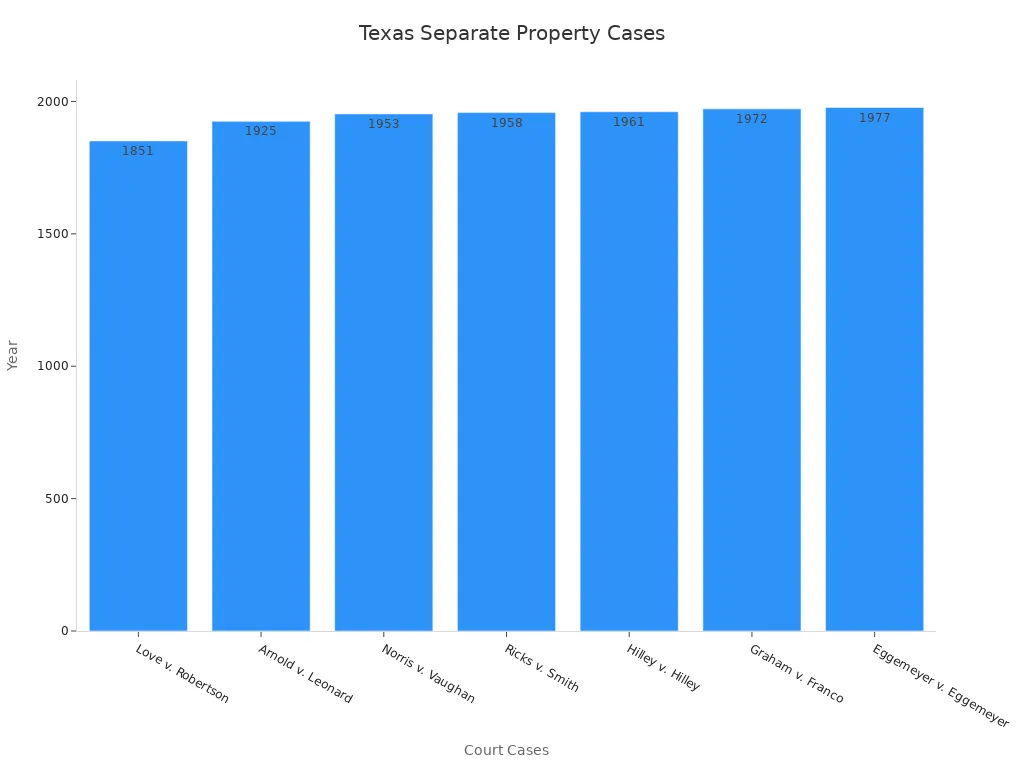Understanding What Community Property Means for Texas Divorce in 2025

In a Texas divorce, it is important to know about community property. Texas is a community property state. Most things you and your spouse get while married are community property. Separate property is what you owned before marriage or gifts just for you. Texas courts do not always split things in half. Judges use a "just and right" rule to divide property. Knowing these rules helps you and your spouse make a fair deal.
Texas Divorce and Community Property

What Counts as Community Property
If you get divorced in Texas, you should know what community property is. Texas uses community property rules. Most things you and your spouse get while married belong to both of you. The law says anything you buy or earn during marriage is part of the community estate. It does not matter whose name is on it or who made the money.
Here are some examples of community property:
Money from jobs or businesses during marriage
The family house and other homes bought while married
Bank accounts and investments started after marriage
Retirement accounts with money added during marriage
Debts, like credit cards or loans, from during marriage
Community property laws in Texas also include money made from separate property. For example, if you owned a rental house before marriage, rent you get during marriage is usually community income. Debts are important too. Most debts you and your spouse get during marriage are community debts, even if only one person’s name is on them.
What Is Separate Property
Separate property is not the same as community property. You have separate property if you owned it before marriage, or if you got it as a gift or inheritance just for you. Money from personal injury cases can be separate property, except for lost wages. The difference between separate and community property matters because the court does not split separate property in a divorce.
You need clear proof to keep something as separate property. This can be things like deeds, bank papers, or contracts. If you mix separate property with community money, it can change. For example, if you use community money to pay for a house you owned before marriage, part of the house can become community property.
Note: If you cannot show proof that something is separate property, the court will call it community property. Keeping good records helps protect your rights.
Texas courts have used these rules for a long time. The chart below shows big court cases that helped decide how property is sorted in a Texas divorce:

Knowing what each thing is helps you and your spouse see what the court might split. This knowledge is important for a fair divorce.
Texas Community Property Laws
Presumption of Community Property
Texas law starts with a strong rule. The court thinks all property you and your spouse own at divorce is community property. This means almost everything you both have is part of the community estate unless you can prove it is not. The law says you and your spouse both own community assets equally, even if only one name is on the title.
You can see how these laws changed over time by looking at important court cases and laws:
Evidence Type | Description | Supporting Cases / Statutes / Historical Data |
|---|---|---|
Legal Precedents | Texas courts say community property becomes tenancy in common after divorce | Busby v. Busby (1970), Taylor v. Catalon (1942), Jenkins v. Volz (1881), Harrell v. Harrell (1985) |
Statutory Development | A 1987 law made the "just and right" rule for dividing community property | Texas Family Code § 9.201-9.204, Act of July 20, 1987 |
Judicial Clarification | The Supreme Court of Texas said new laws add to old ones, not replace them | S.C. v. M.B. (2022) |
Historical Context | In the 1800s, the law said community property ends at divorce and becomes tenancy in common | Kirkwood v. Domnan (1891) |
Legal Principles | Community property only exists during marriage; after divorce, it changes to tenancy in common | Cameron v. Cameron (1982), Schlueter v. Schlueter (1998) |
Practical Guidance | Courts must handle all community property in divorce to avoid default tenancy in common | Busby v. Busby (1970) |
Texas law says if you cannot prove something is separate, the court will call it community property. This rule protects both people and helps the court split things fairly.
Proving Separate Property
You must show strong proof if you say something is only yours. Texas law puts the job on you to prove an asset is separate property. The court will not accept guesses or weak proof.
To help your case, you can do many things:
Use the inception of title rule to show you owned something before marriage or got it as a gift or inheritance.
Collect and organize financial papers, like bank statements, real estate records, business papers, tax returns, and appraisals.
Hire experts to trace where assets came from and find hidden property or debts.
Show prenuptial or postnuptial agreements that explain who owns what.
Ask for expert values from business or real estate appraisers for tricky assets.
Keep inheritance money in its own account and write down every transaction.
Make a timeline of when and how you got each asset.
Be honest and share all information to avoid trouble and fights.
If you mix separate property with community property, the asset can change. Courts look closely at your records to decide if the property stayed separate or became community property. Good records and expert help can protect your rights under Texas law.
Property Division
Just and Right Standard
When you go through a texas divorce, the court uses the "just and right division" rule for dividing your property. This rule means the judge looks for a fair split, not always an equal one. The court checks many things to decide what is fair. You and your spouse might have different incomes, health, or ages. The judge also looks at the size and type of everything you own together. If one spouse caused the breakup, the court may give more to the other spouse. The judge wants to make sure the division of assets fits your situation.
Tip: You should gather documents like deeds, gift letters, and inheritance papers. These help prove the status of your property and show if something is separate or community property.
The court does not include separate property in the split. You must show clear proof if you want to keep something as separate property. Sometimes, you need experts like forensic accountants to trace where money or property came from. This helps keep the status of your separate property clear.
50/50 Divorce State Myth
Many people think texas divorce always means a 50/50 divorce state split. This is not true. Texas does not require an equal split of community property. The law asks for a just and right division instead. The judge looks at what is fair for both you and your spouse. Sometimes, one spouse gets more because of health, age, or who takes care of the children. The court also checks if one spouse wasted money or acted unfairly. You should not expect an automatic half-and-half split when dividing your property.
Note: The court tries to make the division fair, not just equal. This is why texas divorce law stands out from other states.
Factors Affecting Division
The judge considers many things when deciding how to divide community property. Here are some key factors:
Length of the Marriage: Longer marriages often lead to a more even split. Shorter marriages may see less property to divide.
Financial Contributions: The court looks at both money earned and work done at home. If you stayed home to help your spouse’s career, the judge counts that.
Separate Property: If you owned something before marriage or got it as a gift or inheritance, you can keep it. You must prove its status with strong records.
Custody Arrangements: If you have children, the judge may give the family home to the parent who has custody.
Behavior of the Spouses: If one spouse was cruel or wasted money, the court may give more to the other spouse.
Needs of the Spouses: The judge checks if one spouse needs more help, like a stay-at-home parent who must find a job.
Other Relevant Factors: The court listens to any other facts you or your lawyer share. This helps the judge make a just and right division.
You should prepare for property division by collecting all your financial records. Good records help you show the status of your property and make your case stronger. Legal help can guide you through dividing your property and protect your rights.
Remember: The goal is a fair and equitable split, not always an equal one. You and your spouse both have a say in how the court divides your property.
Protecting Separate Property
Documentation and Tracing
You must have strong proof to keep your separate property safe in a Texas divorce. Courts want to see clear records that show where your property came from. They also want to know how you kept it apart from community property. Good records help you meet the high standard of "clear and convincing evidence" that Texas law asks for.
Here are some good ways to protect your separate property:
Keep your separate property in its own accounts. Do not use these accounts to pay for things you share with your spouse.
Save all papers that show you bought something before marriage or got it as a gift or inheritance.
Do not mix your separate money with community money. Mixing makes it hard to prove what is yours.
Use prenuptial or postnuptial agreements to say which things are separate.
Talk to a family law attorney for help with agreements or tracing your property.
If your money is hard to track, hire a forensic accountant to help find where it went.
A table can show how these steps work in real life:
Practice | Example | Why It Matters |
|---|---|---|
Bank statements | Show original deposits of inheritance money | Proves the source of separate property |
Property appraisals | Value of a house owned before marriage | Confirms asset’s separate status |
Forensic accounting | Tracing funds through joint accounts | Helps courts see the true origin of assets |
Legal agreements | Prenuptial or postnuptial contracts | Clearly defines separate property in writing |
Tip: Keep your records neat and current. This makes it easier to show your proof in court.
Mixed or Commingled Property
Sometimes, separate property and community property get mixed together. This is called commingling. When this happens, you must work harder to show what is still yours.
Here are steps to help protect your separate property if commingling happens:
Write down every time you use your separate property.
Use tracing to follow your money or things through different accounts.
Make sure you do not miss any steps in your records. Courts need a full chain of proof.
Get help from experts, like forensic accountants, if you cannot trace the money yourself.
Remember, the court will call property community unless you prove it is separate.
Texas courts use ways like the clearinghouse theory to follow separate property through accounts, even when money moves in and out a lot. If you can show a clear chain of what happened, you have a better chance to keep your separate property. Always remember, you must prove your case.
Complex Assets in Texas Divorce

Family Home
The family home is often the biggest thing in a Texas divorce. The court looks at who owns the house and follows community property rules. If you and your spouse bought the house while married, it is community property. Judges check who paid for it and who cares for the kids. They also see if someone used joint money for themselves. Sometimes, the parent with main custody gets the house. You might need to get a new loan to split money matters. The court also looks at any debts tied to the house. Judges want things to be fair, especially if one person used joint money for their own use.
Businesses and Investments
Splitting up businesses and investments is hard. Community property rules cover businesses started or grown during marriage. You need to collect all money records, like tax papers and bank slips, to show what is community property. Courts use experts to find hidden things and set a fair price. If you own a business, you might keep it but pay your spouse their part. Community property laws also cover investments, stock options, and things like cryptocurrency. You need good records and expert help to protect yourself and avoid errors.
Tip: A Certified Divorce Financial Analyst can help you know what your business and investments are worth. This helps you plan for taxes and your future.
Retirement Accounts
Retirement accounts are another tricky part of community property in Texas divorces. Any retirement money earned during marriage is community property. Courts use special orders called QDROs to split accounts like 401(k)s and pensions without tax trouble. More older couples are divorcing, so retirement accounts are often very valuable. Community property rules mean you must look closely at account papers to see what was earned before and after marriage. Social Security usually stays separate, but other retirement money must be split fairly. You should talk to a lawyer or money expert to avoid big mistakes.
Community property laws also affect digital assets, mineral rights, and property in other states. Courts use experts and good records to handle these things.
Steps for a Fair Outcome
Preparing Financial Records
You need good financial records to get a fair divorce. Start by gathering important papers. Collect tax returns, pay stubs, and bank statements. Get retirement account papers, property deeds, and mortgage documents. Find vehicle titles and insurance policies too. If you own a business, add business records. Make digital copies and sort them into groups. Use safe cloud storage so you can find them easily.
Make a budget to show what you need after divorce. List your basic expenses and extras. Save money for emergencies, enough for three to six months. Keep your valuables safe and change your account passwords. Write down all talks with your spouse. Use digital tools to organize your records and make backups. These steps help protect your rights during divorce.
Consulting a Divorce Attorney
A good attorney can help you with Texas community property laws. Bring all your financial and legal papers to your first meeting. Include records of talks, child papers, and any agreements. Your attorney will explain how the court splits property. They will tell you what is separate or community property. They will also help you learn about spousal maintenance and what proof you need.
Ask your attorney how to handle joint accounts. Do not change anything without legal advice. Your attorney can help you find proof if you worry about your spouse’s parenting or money actions. Good legal help makes sure you follow Texas rules and get a fair divorce.
Negotiation Tips
Stay calm and polite when talking to your spouse. This helps you both work toward a fair deal. Get ready for meetings by knowing your goals and having your papers ready. Be willing to make fair trades. Mediation is a good way to fix problems. A neutral mediator can help you and your spouse agree. Texas law likes mediation because it can stop long court fights.
Work with your attorney to plan your negotiation. Focus on facts and clear goals. This helps you get a divorce agreement that fits your needs and protects your future.
You have learned what community property means in Texas. Texas courts do not always split things in half. They use the "just and right" rule to divide what you own. Judges look at things like how much money you make, your health, and who takes care of the kids. You need good records to show what is your separate property.
Knowing these rules helps you keep your rights safe. For the best results, talk to a Texas divorce attorney who can help you with every step.
FAQ
What happens if you cannot prove something is separate property?
If you cannot show clear proof, the court will treat the property as community property. You need strong records to keep your separate property safe. Always keep deeds, bank statements, and gift letters.
Can you keep your house after a Texas divorce?
You might keep your house if you can buy out your spouse’s share or if the court awards it to you. The judge looks at who has custody of children and who can afford the home.
Do you have to split debts in a Texas divorce?
Yes, Texas courts divide community debts along with assets. The judge decides who pays each debt. You should list all debts and show which ones you got during the marriage.
Is a business started during marriage always community property?
Most businesses started during marriage count as community property. The court may split the value or award the business to one spouse. You need business records to show its value.
How does a prenup affect community property in Texas?
A prenuptial agreement can change how the court divides property. If you have a prenup, the judge will follow its rules. You should give the court a copy of your agreement.
See Also
Understanding Asset Protection: Separate And Community Property In Texas
How To Rebuild Your Life After Texas Divorce In 2025
Dividing Personal Property During Divorce Proceedings In Texas
The Role Of Prenuptial Agreements In Texas Divorce Asset Division
Subscribe to get the updates!
Sign up now to receive timely blog updates.
I accept the email subscription terms.

